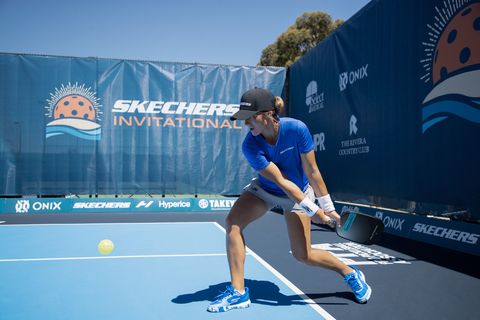It’s been another week with far more retail news than there is time in the day. Below, we break down some things you may have missed during the week, and what we’re still thinking about.
From Skechers becoming the official footwear sponsor of the Pickleball Canada National Championship to Zales launching jewelry rental, here’s our closeout for the week.
What you may have missed
Revlon officially exits bankruptcy
Revlon on Tuesday announced that the company completed financial restructuring and emerged from Chapter 11. The new, private company is named Revlon Groups Holdings. The beauty company wiped out over $2.7 billion in debt and has $1.5 billion in outstanding debt. It is now owned by its former lenders including Glendon Capital Management, King Street Capital Management and Oak Hill Advisors, among others.

“Less than a year after beginning the financial restructuring process, I’m proud to say that we are emerging today as a stronger company that is well positioned for long-term growth,” Debra Perelman, Revlon’s CEO, said in a statement. “With a simplified capital structure, significantly reduced debt, and a new, highly experienced and committed Board of Directors, we look forward to unlocking the full potential of our globally recognized brands and continuing to offer our customers the iconic products they have loved for decades.”
Zales introduces jewelry rental
Signet is introducing a jewelry rental program to its Zales banner. Through the program, customers can schedule an in-store appointment to select and reserve styles, rent the pieces for 14 days and decide if they would like to return or purchase the items after that period.
The pilot program allows customers to choose from 36 different pieces — including necklaces, earrings, bracelets and rings — and will initially be introduced at 28 Zales stores, according to Women’s Wear Daily, which first reported the news. The company indicated on its website that it will be adding more stores soon. Rental prices are around 10% of the purchase price — so a necklace that costs $900 to rent has a purchase price of $9,000 — but rental prices begin at $100, according to the company website.
The rental program is done in partnership with jewelry subscription company Rocksbox, which Signet acquired in 2021.
Peacock struts new shoppable ads
Move over Home Shopping Network, NBC has expanded its ad reach with premium Peacock subscribers using AI-powered shoppable ads, according to a report from TechCrunch.
Peacock, NBCUniversal’s streaming service which allows users to stream television shows, movies and other original content, is home to Must ShopTV. The technology allows viewers to buy products that appear in shows using an algorithm trained to identify shoppable products. Once a QR code appears on the screen, viewers can engage the prompt using their mobile devices to purchase the item, according to the report.
Retail therapy
Skechers bets big on pickleball
Footwear brand Skechers on Wednesday announced it would be the official footwear sponsor of the Pickleball Canada National Championship.

“Skechers currently sponsors every major elite professional pickleball tour in the United States and our athletes are winning on the court, so it’s the perfect time to expand our reach to the biggest circuit in Canada so that we can connect with more consumers across North America and around the world as they discover and fall in love with this incredible sport,” Skechers president Michael Greenberg said in a statement.
The brand first introduced its pickleball collection at the U.S. Open Pickleball Championships in Naples, Florida, last year.
Sam’s Club tests burger robots
Membership-only retailer Sam’s Club is testing a robot able to make a burger in Fayetteville, Arkansas. Sam’s Club locations feature an in-store cafe serving snacks, lunch and dessert options, but doesn’t currently offer a burger. According to Axios, the robot does every step from grinding the beef to adding seasoning and assembling the burger. Any toppings a customer may want must be added by an employee, but only for now. The robot will stay in the Fayetteville store till June, and the retailer currently doesn't have plans to put the burger robots in other stores. Although the goal is for the process to be fully automated, the company isn't looking to expanding its menu offering, but rather is testing how it can add tech to its operations.
What we’re still thinking about
20%
That’s the percentage of Shopify’s workforce that is being laid off, according to a Thursday announcement from the e-commerce company. Shopify is selling the majority of its logistics business to Flexport.
“Logistics was clearly a worthwhile side quest for us, and started to create the conditions for our main quest to succeed. From the beginning, we worked with lots of partners on all aspects of this same problem: warehouses, robotics, transportation, cross-dock, freight,” CEO Tobias Lütke said in a public memo to employees.
Shopify also reported its Q1 earnings results at the same time, showing $717 million in gross profit and an operating loss of $193 million, up from $98 million a year ago
63%
That how much traffic to Bed Bath & Beyond’s stores declined in the past four years, according to a report from Placer.ai. Footfall at others in the home furnishings segment was also down, but only by 10.4%, per the report. That wasn’t just because the retailer had closed a significant number of stores. During that time, Bed Bath & Beyond’s average visits per location dropped 47.3%, “indicating that the stores that remained open were attracting significantly less traffic than they had been several years before,” according to Placer.

Now that all of Bed Bath & Beyond’s stores are set to close under Chapter 11, rivals are poised to pick up that traffic. Those include Dollar Tree, Costco, Hobby Lobby, Sam’s Club and Dollar General, though the winners by far are Walmart and Target, Placer found. Other analysts see HomeGoods, Amazon, Kohl’s, Wayfair and Overstock also benefiting. However, the share will likely be spread pretty thinly, according to Ellis Verdi, president of advertising agency DeVito/Verdi.
“When one chain disappears, all the other chains celebrate, thinking they're going to capture the business,” he said by phone. “It never really works out that way. People are not all running from Bed Bath to Macy's. There’s 500 different places they could go.”
What we’re watching
Santa Monica scores the newest Wilson
Wilson Sporting Goods on Thursday debuted its first retail store on the West Coast.

Located in within Santa Monica’s Third Street Promenade shopping district, the 4,500 square foot space features an expansive product offering and immersive experiences, the company said in an announcement.
The in-store merchandise and service offerings include an area for customers to try out products, including a basketball hoop; a hitting wall; and on-site racquet stringing. The new store also allows shoppers to rent select products to test on their own outside of the store before purchasing. The store also features Wilson’s newest styles from the retailer's technical sportswear collection.
“From our first retail location in Chicago to opening multiple locations across the country, Wilson is dedicated to celebrating athletes of all levels through a premium range of products and experiences,” Wilson Sportswear President and General Manager Gordon Devin said in an announcement. The California location brings the company’s store count to six.













